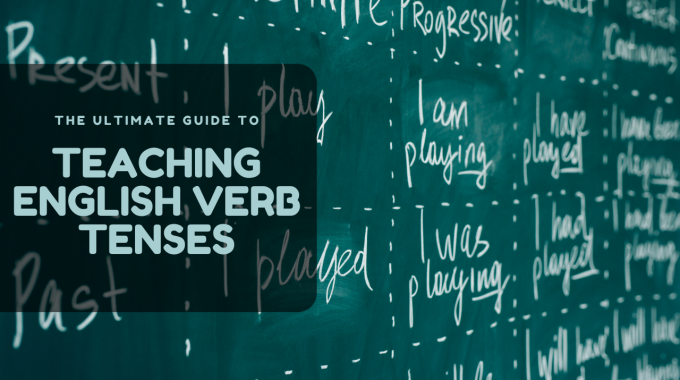Native speakers of a language can also have doubts about their native language. Some words…
The Ultimate Guide to Teaching English Verb Tenses
English verb tenses can be confusing, even for English teachers! Here is an extensive grammar guide to help you differentiate the most common verb tenses in English.
The Present Tenses

Simple Present:
1) Things that are always true.
The sun shines bright in the sky.
2) Habits or regular happenings.
I play football every Saturday.
3) Permanent situation (at least for the moment).
I live in México.
4) Describing short action happening now.
He dribbles the ball and scores!
5) Future schedule.
The train leaves at 6pm.
Present Continuous:
1) Actions happening now.
She is meeting with her boss.
2) Temporary situation.
I am working at Google.
3) Temporary habits.
He’seating a lot these days.
Present Perfect:
1) Action started in the past and hasn’t finished yet. (Uses ‘for’/’since’)
She has known him since she was 5 years old.
2) Action happened at an unspecified time in the past.
We have visited Paris already.
3) Repeated actions in the past.
They have gone to the zoo three times.
4) Past action which has an effect on the present.
I’ve misplaced my phone.
Present Perfect Continuous:
1) Action began in the past and is still continuing.
She has been studying English for two years.
2) Action began in the past and just finished.
I’ve been waiting for you.
3) Repeated actions that began in the past and still continue.
They’ve been visiting Disneyland every year since she was 5!
4) Recent habits.
We’ve been cleaning the house more frequently!
The Past Tenses
Simple Past:
1) Finished action in the past at a specific time.
We watched a movie at the cinema last night.
2) Facts from the past.
Mozart composed Twinkle Twinkle Little Star.
3) News about the past.
He fell off the bicycle!
4) Hypothetical situation.
If I won the lottery, I would travel the world.
Past Continuous:
1) Overlapping actions.
He was walking home when it started raining.
2) Giving background information in storytelling.
The sun was shining and the birds were singing.
3) Past habits.
She was constantly arriving to work late.
4) Describe what was happening at an exact moment in the past.
At 10pm, they were getting ready for bed.
Past Perfect:
1) Action finished before another action in the past.
When we arrived, they had already eaten.
2) A period of time before a point in the past.
By the time he graduated, he had lived in New York for 4 years.
3) Unreal situation in the past.
I wish I had studied harder! (Meaning I didn’t study hard.)
Past Perfect Continuous:
1) Action that started in the past and continued until another past action.
She had been studying at that school for two years when she met her boyfriend.

The Future Tenses
Simple Future:
1) Future events/plans.
I will go to a party tonight.
2) Future prediction/promise.
I think it will rain tomorrow.
3) Future conditional.
If it doesn’t snow tomorrow, we’ll go to the park.
Future Continuous:
1) Overlapping future actions.
I’ll be waiting when you arrive.
2) Something that will happen in the future and continue for a period of time.
The president will be making his speech tomorrow.
Future Perfect:
1) Action began in the past and will finish before some time in the future.
By 10p.m, she will have finished my work.
2) Prolonged action until a point in the future.
When we get married, I’ll have known my husband for 10 years.
Future Perfect Continuous:
1) Action that started in the past and continues to a point in the future.
In December, he will have been teaching for 10 years.
2) Action continued up until a specific time in the future.
At 6 o’clock, I will have been waiting for an hour.
We hope this guide will be useful in your future English classes!




